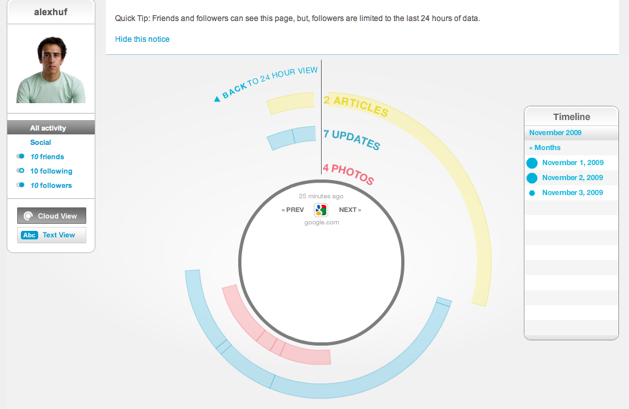 Many of us spend hours a day on our browsers surfing the web both at home and from the office, but we don’t really do much with our web history, which could really serve as a goldmine of information. Nebul.us, a startup launching today in private beta, is looking to tap into this data, leveraging it to offer a cloud-based web history, a productivity tool for monitoring how you’re spending your time online, and a social link sharing service. The site is now in private beta, and 500 TechCrunch readers will be able to gain access by using the invite code ‘techcrunch’.
Many of us spend hours a day on our browsers surfing the web both at home and from the office, but we don’t really do much with our web history, which could really serve as a goldmine of information. Nebul.us, a startup launching today in private beta, is looking to tap into this data, leveraging it to offer a cloud-based web history, a productivity tool for monitoring how you’re spending your time online, and a social link sharing service. The site is now in private beta, and 500 TechCrunch readers will be able to gain access by using the invite code ‘techcrunch’.
Here’s how it works: after installing a browser plugin (the service currently has support for Firefox with IE, Chrome, and Safari on the way), your browser will start monitoring your browsing history and uploading it to the service. Everything is intitally locked down in a private mode — meaning nobody else can see it — unless you visit the site and explicitly decide to share it with your friends. Or, if there are some sites you’d always be comfortable sharing with your friends, you can choose to add it to your ‘Trusted’ list, which means they’ll automatically be shared. The site has a friends system so you can determine who is allowed to following your browser history, or you can choose to share it into a public pool. If there’s a site you never want to have recorded, even in the private mode, you can block it entirely. If you do let something slip by, you can go back and delete it from your history.
The site is well done, with a clean UI and some nice graphics. By default, the site will present your recorded browsing history in a donut shape, with each site visited represented by a colored band. The shape and position of these bands is meant to recall a standard clock face — the length and position of a band corresponds to the time you visited a site. Along with your browser history, you can also import your Tweets and songs played on last.fm which are displayed as parallel bands. It’s fun to play around with, but you can also switch into a more standard list view if you’d like. Also worth pointing out: CEO Alex Huf says that everything on the site was built with touch screens in mind, so the site should play nice with whatever tablet devices are on the horizon.

Nebul.us seems to have two main uses: it can used as both a social site for sharing content with your friends (and to the public, if you’d like), or as a productivity site for figuring out how you’re spending your time online. In the former case, which pits the site against the likes of Digg and Delicious, Nebul.us users effectively vote on their favorite articles not with sharing buttons, but by voting with their browsers themselves. In the latter case Nebul.us goes against services like RescueTime.
It’s nice the Nebul.us has two very different use cases, but I’m concerned it may prove difficult to explain them both to new users who stumble across the site (frankly I was pretty confused at first). Still, Nebul.us is still is fairly early stages so they have plenty of time to figure out how to balance the two. A harder challenge may lie in convincing people to actually share their browser history in the first place: no matter how many security and privacy features Nebul.us offers, putting that data in the cloud is going to be enough to scare off a significant number of potential users.